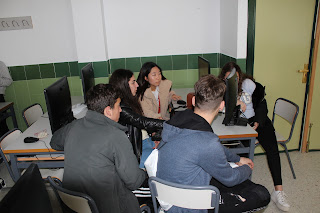Covid is coming!
Some times in life you plan things one way and then you need to go for Plan B or even C.
In the weeks before the start of this mobility, news all over the world and especially in Europe were becoming more intense as to the quick spreading of a new virus outbreak coming from China. The threat of a pandemic was only a future possibility expressed by some virus experts. But things in Italy started to get rough with lots of people getting infected and suffering from severe pneumonia.
We learnt from our Italian and Portuguese partners that they would not attend the mobility in Casar de Cáceres because students were not allowed to go on school trips because of the virus. So we quickly made arrangements in our program to allow them to participate in online activities. The topic of this mobility was “Renewable Energy”, and the plan was to visit several renewable energy production plants during the week. But, unfortunately the WHO (World Health Organization) declared the Sars-CoV-2 coronavirus outbreak a global pandemic on March 11th 2020, that is, on Wednesday that week.
By then, we had already enjoyed the welcoming ceremony and the working sessions with presentations from all the partners (those missing included) and had made a hike to “Casa de los Pinotes”, stopping in a Photovoltaic power plant on the way.
On Tuesday we had visited the Natural National Park of Monfragüe, where we had been able to see through the binoculars of the park rangers some rare birds in their nests in a big rock mountain called “el salto del gitano”.
On the way back from the park, we had seen the building of a very big photovoltaic solar plant and had ended in Cáceres, a medieval town where our students had taken part in a gymkhana to visit and learn about the history of the town.
On Wednesday, we had also visited the Roman city of Mérida, the capital of Extremadura and former capital of the Roman province of Lusitania (which comprised Portugal and part of the western part of Spain at that time). In Merida we had visited the Roman theatre and amphitheatre, the National Museum of Roman Art, the Roman bridge and the Arabic city fortress as well as some amazing old buildings that included the House of Mitreo, an important dwelling from Roman times, and Trajano’s archway.
It was at lunchtime when we had news of the WHO decision and had to come back to Casar de Cáceres and start planning an alternative program as all the places we were going to visit started cancelling our visits. Besides, rumours of an imminent lockout made our partners look for a change to earlier flights. Our Maltese and Romanian partners left earlier than expected, and our Latvian friends remained in Casar de Cáceres till the end of the week.
So on Thursday and Friday we organized several activities as closely related to the project as possible. Our students learnt how to make gamification activities with Kahoot, and enjoyed the typically Spanish “Churros and hot chocolate” breakfast. We also had a session on COVID-19, with a presentation and further debate.
The Diploma Ceremony had to be put forward to Thursday.
On Friday, we had outdoor activities in the school playground that included different sports competitions and vegetable garden work and decoration.
We were sad to see all our partners leave, and we were also worried about a possible cancellation of their flights and if they would have to be on quarantine upon arrival to their countries. We felt also disappointed that the whole project would be affected by this new situation, and many of our final year students who were working hard on the project and were also very enthusiastic about participating in forthcoming mobilities would not be able to benefit from this program if the mobilities were postponed. Tough luck!





























.jpg)














Comments
Post a Comment